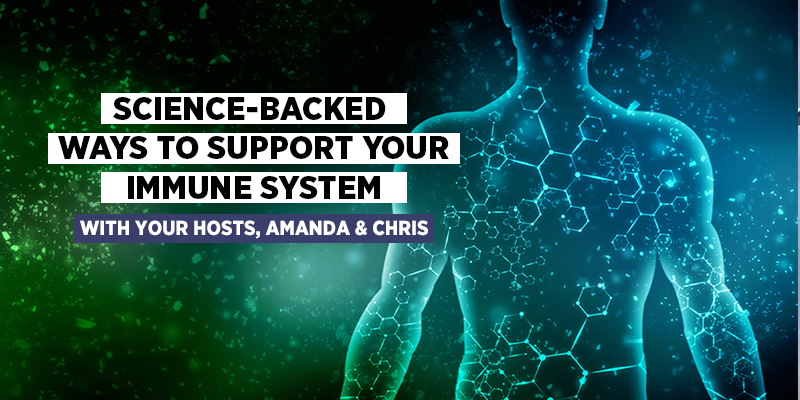
Episode 25: Science-Backed Ways to Support Your Immune System
Show Notes
Whether you’re sick or not, having proper immune support and health is imperative to putting you in a better place to handle stress, sickness, or anything that life throws your way. There is a lot going on in the world right now, and while we certainly don’t have the answers or a cure for Coronavirus, we do have science based studies that show there are ways to help reduce cortisol levels and stimulate your immune system. In this episode we take a deep dive into all things immune-related and share our best research-backed tips to help you stay healthy and feel your best!
In this episode you’ll learn:
-Why smoking cigarettes or vaping nicotine can negatively impact your immune system
-Why it’s important to support your immune system with a wide variety of healthy foods, especially fruits and vegetables
-That acute (moderate to vigorous intensity) exercise is beneficial to the immune system
-That obesity and chronic inflammation can have an impact on immune function
-Why it’s so important to drink alcohol in moderation, especially when it comes to immune health
-How alcohol can negatively affect different aspects of your health
-Why it’s important for immune function to find healthy ways to minimize chronic stress
-A few ways Amanda and Chris deal with stress
-About some supplements that have been shown to help promote relaxation and reduce cortisol (Magnesium, Ashwagandha, B Complex, Reishi, Omega 3, GABA, 5HTP, Theanine, Cava, Valerian Root, Lemon Balm)
-The role caffeine can play in stress and immune health
-Why maintaining connection with others is helpful for reducing cortisol levels
-How activities like chewing gum and listening to music can help with stress
-That quality sleep is crucial to preventing and fighting viruses
-Why maintaining a healthy gut is imperative to nutrient absorption and immune health
-That spending time outside can help your body synthesize vitamin D and help reduce the likelihood of you getting sick
-About some foods that contain high amounts of vitamin D
-How immune strength changes as you get older
-About the lack of connection between weather and increased risk of sickness
-That certain herbs can have antiviral properties and immunostimulatory effects
References:
- Nicotine increases cortisol levels, while reducing B cell antibody formation and T cells’ response to antigens: https://www.ncbi.nlm.nih.gov/pmc/articles/PMC5352117/
- A study in the American Journal of Medicine showed that moderate exercise reduced incidents of the cold: https://www.amjmed.com/article/S0002-9343(06)00782-0/fulltext
- Epidemiologic studies consistently show decreased levels of inflammatory biomarkers in adults with higher levels of physical activity and fitness, even after adjustment for potential confounders such as BMI: https://www.sciencedirect.com/science/article/pii/S2095254618301005
- High exercise training workloads, competition events, and the associated physiological, metabolic, and psychological stress are linked with transient immune perturbations, inflammation, oxidative stress, muscle damage, and increased illness risk: https://www.sciencedirect.com/science/article/pii/S2095254618301005
- Strong evidence indicating that excess fat stores negatively impact immune function and defense from viruses or parasites in obese individuals: https://www.ncbi.nlm.nih.gov/pubmed/22414338
- This study shows that there’s a positive feedback loop between local inflammation in fat tissue and altered immune response, and both of these contribute to the development of related metabolic complications: https://www.ncbi.nlm.nih.gov/pubmed/22429824
- Alcohol consumption does not have to be chronic to have negative health consequences: https://www.ncbi.nlm.nih.gov/pmc/articles/PMC4590612/
- Sleep strengthens T-cells, which are a type of immune cells that fight against regular pathogens: https://rupress.org/jem/article/216/3/517/120367/G-s-coupled-receptor-signaling-and-sleep-regulate
- Meditation, breathing into diaphragm, yoga, mindfulness:
- https://www.sciencedirect.com/science/article/abs/pii/S002239561500206X
- https://www.sciencedirect.com/science/article/abs/pii/S1555415516001732
- Supplements: https://www.ncbi.nlm.nih.gov/pubmed/19865069
- Exercise: https://www.ncbi.nlm.nih.gov/pubmed/12672148
- Chewing gum may help lower cortisol levels: https://www.sciencedirect.com/science/article/abs/pii/S0195666312000943
- Spend time with friends and family: https://www.ncbi.nlm.nih.gov/pubmed/10941275
- Physical touch reduces salivary cortisol and increases oxytocin:
- https://www.ncbi.nlm.nih.gov/pmc/articles/PMC4323947/ https://www.ncbi.nlm.nih.gov/pubmed/19027101
- Laughing: https://www.ncbi.nlm.nih.gov/pubmed/12652882
- A 2010 randomized, double-blind, placebo-controlled trial published in the American Journal of Clinical Nutrition showed that vitamin D helped reduced your likelihood of developing the flu: https://www.ncbi.nlm.nih.gov/pubmed/20219962Georgetown University Medical Center researchers found that sunlight, through a mechanism separate than vitamin D production, energizes T cells that play a central role in human immunity: https://gumc.georgetown.edu/news-release/sunlight-offers-surprise-benefit-it-energizes-infection-fighting-t-cells/
- Georgetown University Medical Center researchers found that sunlight, through a mechanism separate than vitamin D production, energizes T cells that play a central role in human immunity: https://gumc.georgetown.edu/news-release/sunlight-offers-surprise-benefit-it-energizes-infection-fighting-t-cells/
- Herbs: https://www.ncbi.nlm.nih.gov/pubmed/11399518

Recent Comments